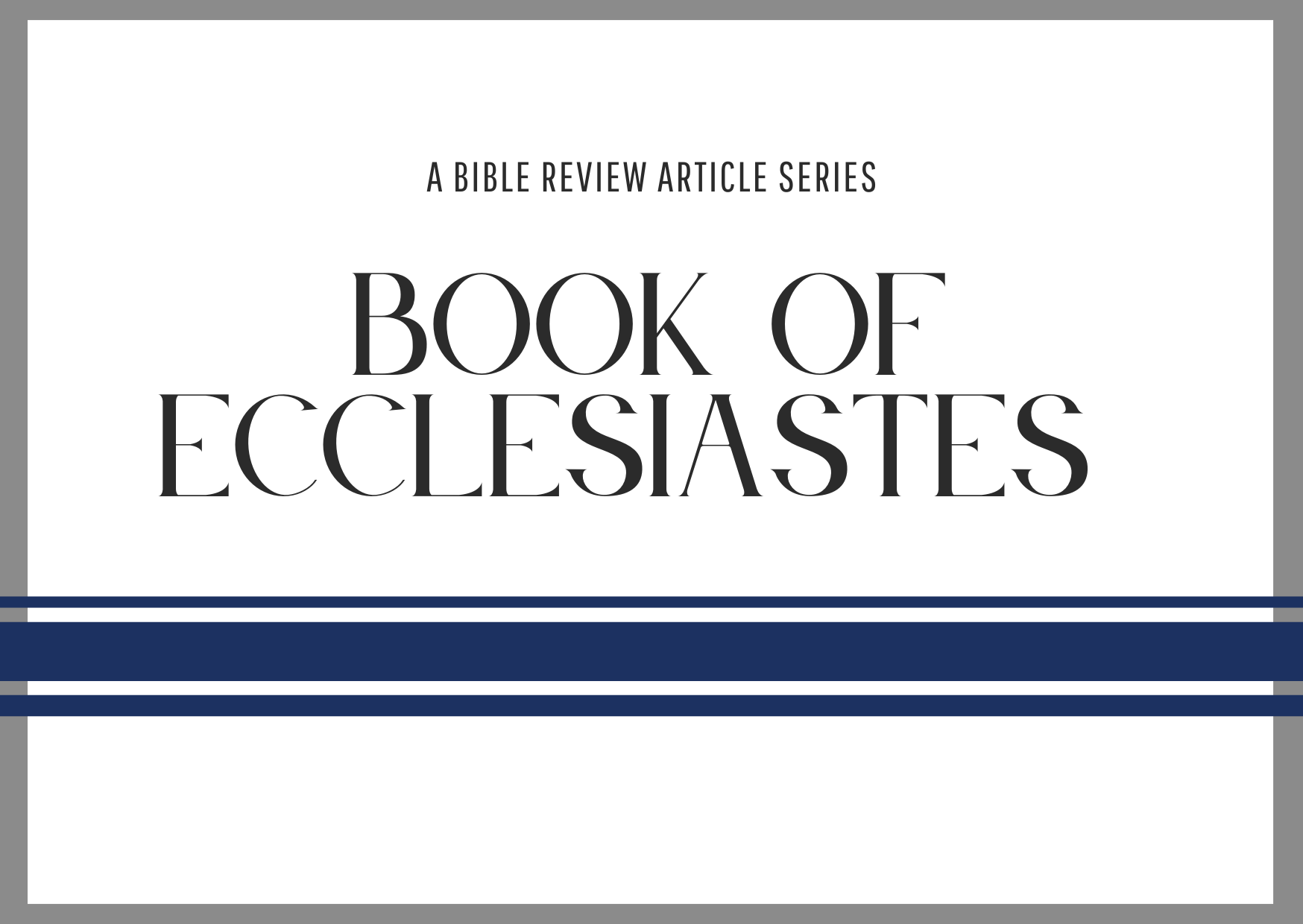
Ecclesiastes:
A Quick Overview
by Milo





Follow us on social media for
FREEBIES and New Article releases.
OR
Sign Up for Our Freebie Email List and Have Freebies Delivered Directly To Your Inbox
Introduction
The Book of Ecclesiastes is a philosophical exploration of the meaning of life and the pursuit of wisdom. It offers a reflective view on the temporary nature of worldly achievements and emphasizes the importance of revering God.
Authorship and Date
Traditionally attributed to King Solomon, Ecclesiastes is believed to have been written in his later years (around the 10th century BC). The author refers to himself as "the Teacher" or "the Preacher" (Qoheleth in Hebrew), suggesting a person imparting wisdom.
Purpose and Themes
Ecclesiastes examines life’s fleeting nature and encourages a perspective centered on God. Key themes include:
- The Vanity of Life: A repeated refrain emphasizing the temporary nature of human efforts.
- Wisdom and Folly: The limitations of human wisdom in providing ultimate fulfillment.
- The Sovereignty of God: Recognizing God's control over time and events.
- The Joy of Simple Blessings: Finding contentment in daily life and labor.
- The Fear of the Lord: Concluding that revering God is the ultimate duty of humanity.
Key Verses
- Ecclesiastes 1:2 - "Meaningless! Meaningless! says the Teacher. Utterly meaningless! Everything is meaningless."
- Ecclesiastes 3:1 - "There is a time for everything, and a season for every activity under the heavens."
- Ecclesiastes 5:10 - "Whoever loves money never has enough; whoever loves wealth is never satisfied with their income."
- Ecclesiastes 7:14 - "When times are good, be happy; but when times are bad, consider this: God has made the one as well as the other."
- Ecclesiastes 12:13 - "Fear God and keep his commandments, for this is the duty of all mankind."
Summary of Content
Ecclesiastes presents the Teacher’s reflections on life, emphasizing the limitations of wealth, wisdom, and human effort. It ultimately concludes that life’s purpose is found in honoring God.
Structure of Ecclesiastes
Chapters 1-2: The Meaninglessness of Life
- Explores the pursuit of knowledge, pleasure, and labor.
Chapters 3-6: God’s Timing and Human Efforts
- Discusses the seasons of life and the limitations of human achievement.
Chapters 7-11: The Pursuit of Wisdom
- Contrasts wisdom and folly while addressing the unpredictability of life.
Chapter 12: Conclusion
- Calls readers to fear God and keep His commandments.
Application and Relevance
The Book of Ecclesiastes is a profound reflection on the **meaning of life, human toil, and the pursuit of wisdom**. Written by King Solomon, the book explores how earthly pleasures, wealth, and achievements are ultimately meaningless ("vanity of vanities") without a deeper purpose in God.
Ecclesiastes teaches us to focus on what truly matters: **fearing God and keeping His commandments** (Ecclesiastes 12:13). It serves as a reminder that material success and pleasure are temporary, but a life centered on God leads to true fulfillment. This message is especially relevant in today’s world, where people often seek happiness in wealth, career, or personal achievements.
Connections to Other Books
Ecclesiastes connects closely with **Proverbs and Job** as part of the wisdom literature in the Bible. While Proverbs offers principles for wise living, and Job addresses suffering, Ecclesiastes questions the purpose of life itself, bringing a unique philosophical depth to Scripture.
In the New Testament, Jesus echoes Ecclesiastes' themes when He warns against storing treasures on earth (Matthew 6:19-21) and emphasizes that true life is found in Him (John 10:10). Paul also reflects this wisdom in Philippians 3:8, where he counts all things as loss compared to knowing Christ.
Study Questions
- 1. What does Ecclesiastes say about the pursuit of wealth and pleasure?
- 2. How does the phrase “vanity of vanities” summarize the book’s message?
- 3. What does Ecclesiastes teach about the unpredictability of life?
- 4. How does Solomon contrast wisdom and foolishness?
- 5. What does Ecclesiastes 3:1-8 teach about the seasons of life?
- 6. How does Ecclesiastes challenge modern ideas of success and happiness?
- 7. Why is the fear of God emphasized at the book’s conclusion?
- 8. How can Ecclesiastes shape a believer’s perspective on work and daily life?
- 9. What role does contentment play in the book’s teachings?
- 10. How does Ecclesiastes point us to Jesus as the ultimate answer?
Frequently Asked Questions
- 1. Who wrote Ecclesiastes?
The book is traditionally attributed to King Solomon, though some scholars debate its authorship.
- 2. What is the main theme of Ecclesiastes?
The primary theme is that **life without God is meaningless**, and true purpose is found in Him.
- 3. Why does the author keep saying “Everything is meaningless”?
Solomon reflects on how earthly pursuits—wealth, wisdom, pleasure—fail to bring lasting fulfillment.
- 4. What does Ecclesiastes say about work?
It acknowledges the **temporary nature** of work but encourages people to enjoy their labor as a gift from God (Ecclesiastes 5:18).
- 5. How does Ecclesiastes relate to Jesus’ teachings?
Jesus reinforces its message by teaching that **true life and fulfillment are found in Him** (John 6:35).
- 6. What does it mean to “fear God” in Ecclesiastes?
It means to **respect, obey, and live in awe of God**, recognizing Him as the ultimate authority (Ecclesiastes 12:13).
- 7. Does Ecclesiastes promote a negative or pessimistic view of life?
No, it ultimately points to finding joy in God, despite life’s fleeting nature.
- 8. What does Ecclesiastes say about wisdom?
It acknowledges wisdom’s value but warns that **human wisdom alone is not enough** for true fulfillment.
- 9. How does Ecclesiastes influence Christian living today?
It reminds believers to **seek eternal treasures** rather than chasing temporary worldly success.
- 10. What is the conclusion of Ecclesiastes?
After exploring life’s complexities, the final message is clear: **Fear God and keep His commandments (Ecclesiastes 12:13-14).**
Daily Reading Plan
| Day |
Reading |
| Day 1 | Ecclesiastes 1 |
| Day 2 | Ecclesiastes 2-6 |
| Day 3 | Ecclesiastes 7-10 |
| Day 4 | Ecclesiastes 11-12 |

More Bible Overviews
Genesis Overview
Exodus Overview
Proverbs Overview
Ecclesiastes Overview
Isaiah Overview
Daniel Overview
Matthew Overview
Gospel of John Overview
Acts Overview
Romans Overview
1 Corinthians Overview
Revelation Overview
Freebie Offers
Sign Up for Our Freebie Email List and Have Freebies Delivered Directly To Your Inbox
Recommended Reading
Feeding Your Spiritual Growth: Best Online Bible Study Platforms
Strengthen Your Spirit: Impactful Bible Study Topics for Believers
Find Your Voice: Expressive Church Journal Prompts for Christians
Journey to Enlightenment: Best Bible Study Tools for Growth
From Busyness to Fruitfulness: A Biblical Approach to Time Management (Part 1)
From Busyness to Fruitfulness: Biblical Strategies for Effective Time Use (Part 2)
SOAP Bible Study and Other Study Methods: Which One is Right for You?
How to Use the SOAP Bible Study Method for a Deeper Walk of Faith
How to Study the Psalms Using the SOAP Method
Applying Biblical Wisdom to Financial Decision-Making
Visit Us on Pinterest









